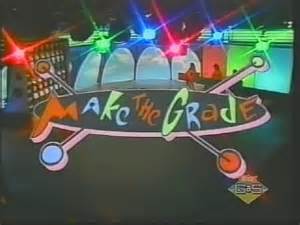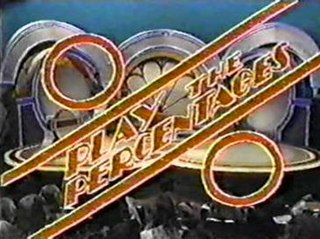
Win Ben Stein's Money is an American television game show created by Al Burton and Donnie Brainard that aired first-run episodes from July 28, 1997 to January 31, 2003, on Comedy Central. The show featured three contestants who competed to answer general knowledge questions in order to win the grand prize of $5,000 from the show's host, Ben Stein. In the second half of each episode, Stein participated as a "common" contestant in order to defend his money from being taken by his competitors. The show won six Daytime Emmy awards, with Stein and Jimmy Kimmel, the show's original co-host, sharing the Outstanding Game Show Host award in 1999. The show was produced by Valleycrest Productions, Ltd. and distributed by Buena Vista Television, both subsidiaries of The Walt Disney Company.

Wipeout is an American game show that aired from September 12, 1988, to June 9, 1989, with Peter Tomarken as host. The series was produced by Dames-Fraser Productions, and was distributed in first-run syndication by Paramount Domestic Television.
The Joker's Wild is an American television game show that has aired at different times since the 1970s. Contestants answer questions based on categories determined randomly by a mechanism resembling a slot machine. The show's title refers to the game's slot-machine mechanism also having jokers.

Twenty-One is an American game show originally hosted by Jack Barry that aired on NBC from 1956 to 1958. Produced by Jack Barry-Dan Enright Productions, two contestants competed against each other in separate isolation booths, answering general-knowledge questions to earn 21 total points. The program became notorious when it was found to be rigged as part of the 1950s quiz show scandals, which nearly caused the demise of the entire genre in the wake of United States Senate investigations. The 1994 movie Quiz Show is based on these events. A new version of the show aired on NBC in 2000 with Maury Povich as host.
Idiot Savants was an American television game show on the MTV network which ran from December 9, 1996 to April 25, 1997. It was created by Michael Dugan and Chris Kreski, directed by Steve Paley, and hosted by comedian Greg Fitzsimmons.

Make the Grade is a children's game show that aired from October 2, 1989 through 1990 on Nickelodeon.
Time Machine is an American game show where contestants compete to answer trivia questions about popular culture and recent history to win prizes. The show aired on NBC from January 7 through April 26, 1985, and was hosted by John Davidson. Charlie Tuna was the announcer, with Rich Jeffries as his substitute. Reg Grundy Productions produced the series, and upon its premiere Time Machine was one of three Grundy series airing on NBC.
Trump Card is an American syndicated game show that aired from September 10, 1990, to May 24, 1991, hosted by Jimmy Cefalo. Debi Massey served as hostess and Chuck Riley was the announcer. The show was produced by Telepictures Productions, Createl, Ltd., and Fiedler-Berlin Productions, with Warner Bros. Television distributing. It was based on the British game show Bob's Full House, which consisted of contestants trying to answer questions to fill up a 15-square bingo board.

Dream House is an American game show that saw contestants competing to win, as the title of the show indicates, a new house. The show originally premiered in primetime on ABC on March 27, 1968, with a daytime edition premiering on April 1, 1968. The primetime series aired weekly until September 19, 1968 and the daytime series aired daily until January 2, 1970, when it was replaced with All My Children. The daytime series was revived for NBC's daytime schedule and premiered on April 4, 1983, running until June 29, 1984.

Play the Percentages is an American game show hosted by Geoff Edwards which aired in syndication from January 7 to September 12, 1980. Jay Stewart announced for the first six weeks, after which Bob Hilton became the permanent announcer.

The Big Showdown is an American game show that aired on the ABC television network from December 23, 1974 to July 4, 1975. Jim Peck hosted the program and Dan Daniel served as announcer.
Trivial Pursuit is an American game show that ran on The Family Channel from June 7, 1993 to December 30, 1994. Loosely based on the board game of the same name, it was hosted by Wink Martindale with Randy West announcing.
Fandango is a country music-themed quiz show which aired on The Nashville Network from March 8, 1983 to August 26, 1988, with reruns airing through March 31, 1989, when it was replaced by Top Card. Fandango was the first TV game show to air on TNN and was one of the longest-running game shows on a cable network.
Pressure Cooker is a game show about cooking and food in general. It was hosted by Chris Durham. It aired on the Food Network in 1998.
Trashed was a television game show that ran on MTV from February 14 to July 23, 1994 with Chris Hardwick as host.
Quicksilver is an American game show that saw contestants answering trivia questions that more often than not resulted in responses that were unintentional puns. The show aired on USA Network from July 27, 1994 to December 23, 1994, with reruns continuing until October 13, 1995 and was produced by Stone Stanley Entertainment. Ron Maestri hosted.

Pick Your Brain is an American syndicated game show that featured children as contestants. The series ran on weekends for one year, debuting on September 18, 1993 and running until May 1994. Pick Your Brain was created by Marc Summers, who also served as its host and executive producer. He was assisted by a giant robot named 2-XL, based on the Tiger Electronics toy of the same name and voiced by Greg Berg.
The Diamond Head Game is an American game show that aired from January 6 to July 4, 1975 in five-day-a-week syndication. Borrowing its name from a long dormant volcano on the island of Oahu, the series was hosted by Bob Eubanks and assistant Jane Nelson, and is the only game show ever to have been taped entirely on location in Hawaii. Alan Thicke composed the theme music.
Rumor Has It was an American daily game show that aired on the cable channel VH1 from June 7 to October 28, 1993. Brian O'Connor was the host and John Ten Eyck announced.
Two Tribes was a BBC game show that aired on BBC Two from 18 August 2014 to 31 August 2015 and was hosted by Richard Osman.







